The Supreme Court of the Philippines has recently issued a landmark decision ordering the regularization of over 7,000 “contractual employees” of PLDT engaged in line installation, repair, and maintenance. This decision, written by Associate Justice Rodil Zalameda, affirms a previous ruling by the Court of Appeals (CA) that found PLDT and its contractors guilty of labor violations.
The High Court acted on consolidated petitions for review on certiorari that challenged the CA decision. The CA ruling was based on a “special assessment and visit of establishment” conducted by a Department of Labor and Employment (DoLE) Assessment Team. The team found that PLDT and its contractors were engaged in labor-only contracting, a practice that is prohibited under Philippine labor laws.
Upon reviewing the evidence, the DoLE recommended that PLDT regularize contractual employees who perform jobs directly related to the company’s business. The court also declared PLDT “solidarily liable” with the contractors to pay the back monetary benefits owed to the workers.
Former Secretary Silvestre Bello 3rd subsequently ordered that 7,416 workers of the contractors be considered as regular employees of PLDT from the time of their initial deployment. He also directed the cancellation of the registration of the declared labor-only contractors. Additionally, PLDT and the contractors were ordered to pay the monetary benefits owed to the contractual employees, amounting to P66,348,369.68.
Bello further declared that contractors who could provide proof of compliance with Department Order (DO) 18-A, which implements Articles 106 to 109 of the Labor Code, would be recognized as legitimate contractors. Those who could demonstrate sufficient proof of payment of the unpaid monetary benefits of their workers would have their monetary liability either reduced or deleted.
In a subsequent resolution, Bello reduced PLDT’s and the contractors’ total monetary liability to P51,801,729.80. The number of regular employees was also reduced to 7,344.
On appeal, the Court of Appeals upheld the jurisdiction of the DoLE-National Capital Region Director and Bello to determine the existence of an employer-employee relationship. According to the CA, this determination is a prerequisite for the exercise of their visitorial and enforcement power. The CA also agreed with Bello’s ruling to prohibit PLDT from contracting out activities, services, jobs, or functions that are usually necessary and desirable in the usual course of its business.
The Supreme Court, in affirming the CA’s ruling, clarified that labor contracting itself is not illegal. Article 106 of the Labor Code expressly allows employers to engage in legitimate labor contracting, which is implemented by the DoLE through DO 18-A and DO 174-2017. However, the Court found that the employees engaged in installation, repair, and maintenance services of PLDT lines are performing work directly related to the company’s telecommunication business.
This landmark decision by the Supreme Court sets an important precedent in the ongoing debate over labor practices in the Philippines. It serves as a reminder to companies that they must comply with labor laws and ensure that their employees are afforded the rights and benefits they deserve.
By regularizing these contractual employees, PLDT and its contractors are now obligated to provide them with the necessary benefits and protections that come with being regular employees. This decision not only upholds the rights of these workers but also promotes fair and just labor practices in the country.
As the Philippines continues to address labor issues and work towards improving the welfare of workers, decisions like these from the Supreme Court play a crucial role in shaping the future of labor relations in the country.
Source: The Manila Times








